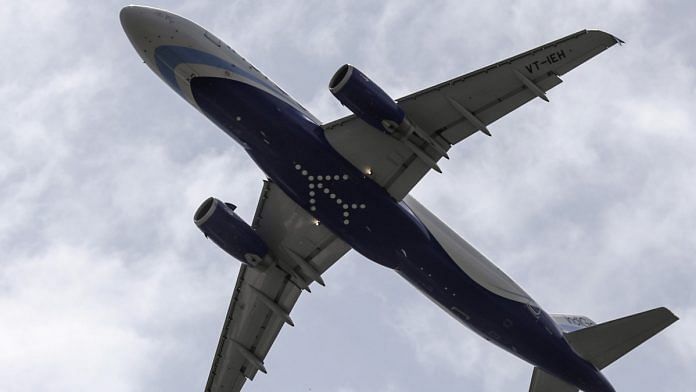New Delhi: The Lok Sabha has cleared the Aircraft (Amendment) Bill, 2020, which aims to make aircraft operations in India more secure, in line with globally accepted standards and practices laid down by the International Civil Aviation Organization (ICAO).
The bill, which now awaits passage in the Rajya Sabha, seeks to amend the Aircraft Act, 1934 that regulates the manufacture, possession, use, operation, sale, import and export of civil aircraft and licensing of aerodromes.
The amendments will give powers to the central government to have supervisory control on the standards of airport, communication, navigation and surveillance, and air traffic management facilities.
Also read: GoAir suspends international flights, offers leave without pay to staff in view of COVID-19
3 key bodies to get statutory powers
The key change in the amended Act will give statutory powers to three central bodies that deal with civil aviation safety and security in India — the Directorate General of Civil Aviation (DGCA), Bureau of Civil Aviation Security (BCAS) and Aircraft Accidents Investigation Bureau (AAIB). Currently, all three operate under an executive order.
Statutory backing to these crucial bodies will allow them to work independently. Once the law is passed, each of the three bodies will be headed by a director general, who will be appointed by the Centre.
While DGCA will now be responsible for carrying out safety oversight and regulatory functions over matters specified in the Act, the BCAS will oversee the same in matters related to civil aviation security.
The AAIB, which was set up only in 2011, shall be responsible for matters related to the investigation of aircraft accidents or incidents. Earlier, the DGCA used to conduct such investigations.
However, the central government will have superintendence over the three bodies, and the power to review their orders in public interest.
Moving the bill in the Lok Sabha Tuesday, Civil Aviation Minister Hardeep Singh Puri said, “The idea to a limited extent is to bring the Indian Aircraft Act of 1934 up to date in the important area of aircraft and civil aviation security, management of the regulator, DGCA. This is a requirement which we should have felt — if I may be allowed to submit — many years ago ourselves.”
Global aviation watchdog ICAO has many a times highlighted the absence of a statutory backing to these organisations, impacting India’s safety rankings. According to ICAO’s universal safety oversight audit for India in November 2017 and February 2018, the country’s score fell to 57.44 per cent from 65.82 per cent in 2017. This score was below Pakistan and Nepal’s, and the global average of 65 per cent.
Speaking to ThePrint, Mark Martin, aviation expert and founder of Martin Consulting, said India was coming under tremendous pressure from regulatory bodies like ICAO and European Aviation Safety Agency to comply with international safety norms.
“It (the new law) will allow incorporation of wider global norms from a safety and compliance perspective, including emphasis on independent investigation in total isolation of DGCA policy/regulatory oversight.”
Martin said the changes will allow segregation of aircraft accident investigation from regulation. “Policy and policing can’t be done by the same authority. This is a step in the right direction and will make investigation more independent amendments also,” he said.
Also read: Coronavirus strands super rich Indians as they can’t fly home even on private jets
Other provisions
The exemption of paramilitary forces like the Border Security Force (BSF) from the purview of the Act, enhancement of fines for various offences, and power to the central government to suspend or cancel license are among other key provisions.
The Aircraft (Amendment) Bill provides for keeping aircraft, belonging to “any other armed forces of the Union constituted by any law for the time being in force” other than naval, military or air force, outside the purview of the Aircraft Act.
The changes will allow exemption to paramilitary forces like the BSF, which comes under the Ministry of Home Affairs.
Currently, under the existing Aircraft Act, such exemptions are provided to aircraft belonging to naval, military or air force.
“All aircraft operated by non-Ministry of Defence organizations including BSF, which is a paramilitary force had to be registered with DGCA as a civilian aircraft,” said Martin.
The amendments have been brought in following repeated requests from BSF to keep its aircraft and personnel outside the purview of the Act as they are not operating civilian aircraft.
Penalties and licence cancellation
Through amendments to the Aircraft Act, the penalty for various offences that are in violation of rules to be notified has been increased from the current Rs 10 lakh to Rs 1 crore.
The offences include carrying arms, explosives, or other dangerous goods aboard aircraft, contravening any rules notified under the Act, and constructing buildings or structures within the specified radius around an aerodrome reference point.
The amendments also provide for suspension or cancellation of licence, or certificate of approval issued to a person if they contravene any of the provisions.
Such licences include those given for the establishment of an air transport service, establishment of aerodromes, and operation, repair, and maintenance of aircraft.
Also read: Why did Boeing’s warning on 737 Max fail to stop second crash?






